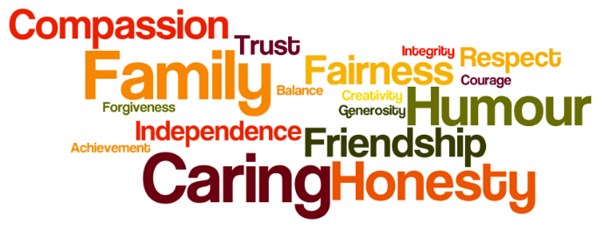People want a more caring and compassionate society
24 Jan 2013 | Barrett Values Centre
** Researchers uncover major disconnect between what
matters most to people and how they feel UK society is currently
operating **
People living in the UK want a more caring and compassionate
society, with greater accountability and honesty and more effective
governance, a major new report reveals.
Researchers have found caring for the elderly and disadvantaged,
affordable housing and employment opportunities come top of British
citizens' wish lists. The ground breaking study, which is being
launched today, has been compiled by Barrett Values
Centre (BVC) in consultation with the Office for National Statistics (ONS) and
with support from Action for Happiness.
The report, Increasing Happiness by Understanding What People
Want, is based on questions asked to 4,000 people living in
England, Scotland, Wales and Northern Ireland. It has identified
the personal values of people living in the UK, as well as the
values they currently experience in their local communities and in
the nation as a whole, along with the values they most want to see
reflected in their communities and the nation.
The UK is the twenty-fourth country to be studied by BVC in the
past five years. The results of the study are being provided to the
Government in the hope that they will influence future policy.
The report shows that people living in the UK value meaningful,
close relationships and operate with a strong sense of integrity.
The top personal values selected include caring, family, honesty,
humour and fun, friendship, fairness and compassion, as well as
independence, respect and trust.

When asked what values they currently experience in their local
community, responses are closely aligned to these personal values,
with respondents pinpointing quality of life, family, friendship
and helpfulness. Other values highlighted included safety,
community services, buy local and a sense of community. They also
indicate that they experience drug/alcohol abuse and uncertainty
about the future.
In contrast, when asked about the values they see operating in
their nation as a whole, the picture is very different. The top
values people see in the UK are bureaucracy, crime and violence,
uncertainty about the future, corruption, blame, wasted resources,
media influence, conflict/aggression, drugs/alcohol abuse and
apathy.
When asked which values they would like to see operating, UK
citizens identified caring for the elderly and disadvantaged,
affordable housing, employment opportunities, accountability,
honesty, government effectiveness, effective healthcare, employment
opportunities and dependable public services. At a community level,
in addition to wanting to see more focus on caring for the
disadvantaged and the elderly, people want to have more affordable
housing, dependable public services and employment opportunities.
They also want to see an increased focus on community services and
more concern for future generations.
Phil Clothier, CEO of Barrett Values Centre, said: "It's great
to see that most people feel positive about what is happening in
their local communities, but disturbing to see the level of
discontent that exists at a national level. Among the top terms
people use to characterize the national picture we find
bureaucracy, crime, violence, uncertainty about the future,
corruption, blame and wasted resources. Citizens do not perceive
that our society is operating as they want it to."
The study also measured the level of dysfunction people feel
exists in the UK and their local community - coined in the report
as 'cultural entropy'. The results show a 59% level of cultural
entropy at the national level, compared to just 22% at a community
level.
With an overall national entropy result of 59%, the UK has one
of the highest levels of cultural dysfunction recorded in nine
European countries studied by BVC to date. France, Latvia, Belgium,
Finland, Sweden, Switzerland and Denmark have all recorded better
scores than the UK.
Richard Barrett, founder and chairman of the Barrett Values
Centre and author of Love, Fear and the Destiny of Nations, said:
"After freedom and equality, accountability is the next most
important value to put in place in order to build a
well-functioning democracy. People in the UK clearly believe that
this value, along with honesty, is lacking among our
decision-makers. We will only correct this situation if our leaders
take up the challenge of building a values-driven society".
Dr Mark Williamson, director of Action for Happiness, said: "Our
values have a huge impact on the society we live in, so this first
national assessment of UK values is very welcome. At a time when
many people fear we are losing our moral foundations, this research
shows that what people in the UK actually value most of all is
caring for others. This is reflected both in their personal values
and also the values they would most like to see at the national
level. I find it very encouraging that, on the whole, we Brits have
a deep concern for our fellow citizens and want to live in a
society which is compassionate and fair. However, the research
suggests that we need political leadership which better reflects
the values of the UK people".
---
Media: For more information or to arrange an interview or
briefing with the authors of this report, please call Amy on 07857
145 257 or email [email protected]
The full report can be downloaded at www.valuescentre.com/ukvalues
Tags:
Do things for others